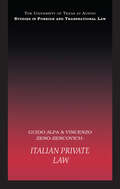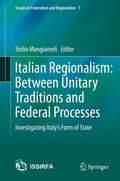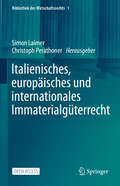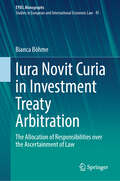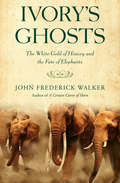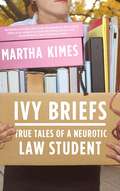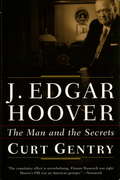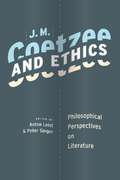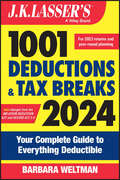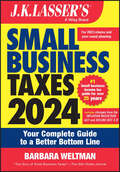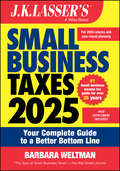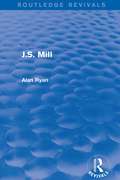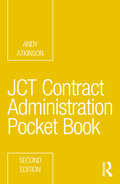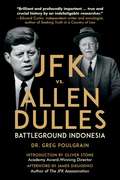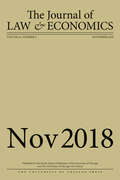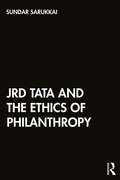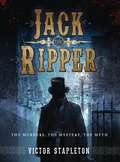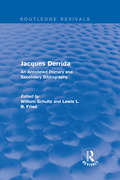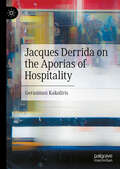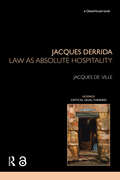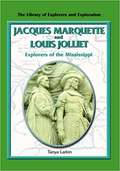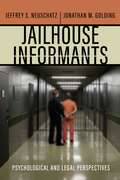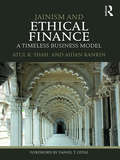- Table View
- List View
Italian Private Law: Sketches Of The New Italian Private Law (UT Austin Studies in Foreign and Transnational Law)
by Vincenzo Zeno-Zencovich Guido AlpaItalian Private Law provides an excellent overview and analysis of Italian private law and its transition from the early twentieth century legal tradition to a system based on constitutional values, geared towards European integration. Exploring the eclectic yet systematically solid foundations of Italian private law, which has adapted itself to the ever growing pressure of EU legislation, Alpa and Zenovich look at the legislative system as well as the profound influence of case-law and legal scholarship. It examines: family law succession legal persons businesses and companies property law contract law tort law. This volume is a key resource for legal scholars, practitioners and students who want to gain a deeper knowledge of Italian private law in their research, professional or academic activity.
Italian Regionalism: Between Unitary Traditions and Federal Processes
by Stelio MangiameliThe object of this book is to describe the institutional modifications of the Italian form of state more than ten years after the review of Title V - Part II of the Italian Constitution - for an audience that goes well beyond the Italian national boundaries. The fifteen essays that make up the book discuss the birth and evolution of the Italian regionalism (including those regions with Special Statutes) as well as reforms of 1999-2001. A particular attention is devoted to the role of autonomy in defining regional statutes, regional forms of government, and regulatory and administrative powers. These are subjects on which there is by now an abundant body of constitutional case law, which is extensively referred to by the chapters. The role of the regions vis-à-vis the local bodies and vis-à-vis the European and international order is also discussed, as the right to negotiate with foreign powers has now been conferred on the regions. Lastly, the volume presents contributions on regional finance and on the new law on fiscal federalism, as well as on regional powers in the area of health and welfare.
Italienisches, europäisches und internationales Immaterialgüterrecht (Bibliothek des Wirtschaftsrechts #1)
by Christoph Perathoner Simon LaimerDieser Open Access Band bietet sowohl deutsch- als auch italienischsprachige Beiträge zu wesentlichen Bereichen des gewerblichen Rechtsschutzes und des Urheberrechts aus der Sicht des deutschen, italienischen und österreichischen Rechts sowie zum TRIPS-Abkommen samt einem Blick auf das vorläufig in Kraft getretene Handelsabkommen zwischen Kanada und der Europäischen Union (CETA). Ein Schwerpunkt ist Schadenersatzansprüchen aus der Verletzung von Immaterialgüterrechten gewidmet, wobei die bei grenzüberschreitenden Sachverhalten auftretenden Fragen der internationalen Gerichtszuständigkeit und des Kollisionsrechts speziell behandelt werden. Darüber hinaus werden Bezüge zum italienischen Verfassungsrecht sowie zum europäischen Wettbewerbsrecht hergestellt und auch wirtschaftsstrafrechtliche Aspekte angesprochen. Schließlich wird ein Ausblick auf die zukünftige Entwicklung des internationalen Immaterialgüterrechts in der Europäischen Union gegeben. Ausgangspunkt für das Buch bildete der vom Internationalen Forum für Wirtschaftsrecht getragene 1. Bozner Wirtschaftsrechtstag, bei dem besonderes Augenmerk auf die Berührung des deutschsprachigen Rechts- und Wirtschaftsraumes mit dem italienischen gelegt wird.
It’s Your World—if You Don’t Like It, Change It
by Mikki HalpinYou can change the world. Free Speech. Racism. The Environment. Gay Rights. Bullying and School Safety. Animal Welfare. War. Information about Safe Sex and Birth Control. Free Speech. HIV and AIDS. omen's Rights. These are the issues you care about-- and now you can do something about them. It's Your World will show you how to act on your beliefs, no matter what they are, and make a difference. The information inside includes: The basics of activism Activism projects and outreach ideas The 5-minute activist How to be an activist at home, at school, and in your community Stories from teenagers who have taken on the world -- and won Resources including books, movies, and Web sites and much, much more. Whether at home, in school, or in your community, you have the power and the ability to create change, even if you aren't old enough to vote. Don't wait until you're eighteen to flex your political muscles-- start right now!
Iura Novit Curia in Investment Treaty Arbitration: The Allocation of Responsibilities over the Ascertainment of Law (European Yearbook of International Economic Law #45)
by Bianca BöhmeHow much legal discretion do arbitrators truly have in investment treaty arbitration? Iura novit curia – literally "the judge knows the law" – is a well-established procedural principle across various legal systems, empowering and/or requiring adjudicators to ascertain and apply the law independently, even beyond the arguments presented by the parties. Yet, its specific role in investment treaty arbitration remains largely unexplored. This book presents a comprehensive and in-depth examination of iura novit curia in investment treaty arbitration. Against the backdrop of ongoing global reforms of the international investment protection regime, the principle holds the potential to enhance accurate decision-making and reinforce the substantive equality of arms between parties. The book traces the historical development of iura novit curia, from Roman law to contemporary civil and common-law procedures, providing a comparative foundation for its modern application. It then examines how international courts and tribunals allocate responsibility for legal ascertainment, exploring its role in public international law and international commercial arbitration. Building on this background, the book shifts its focus to the core question: whether and how iura novit curia should be applied within the unique legal framework of investment treaty arbitration. In this context, the book inter alia addresses the following legal questions: On which legal basis can iura novit curia be applied in investment treaty arbitration? Does its application align with the policy objectives driving the ongoing reform of the international investment protection regime? Is the independent ascertainment of law a power or a duty for investment arbitrators? After answering these foundational questions, the book then delves into the two main elements of iura novit curia: the notion of legal knowledge and the ex officio ascertainment of law. It critically examines the level of legal knowledge expected from investment arbitrators and whether specific knowledge requirements should be mandatory. Regarding the ascertainment of law, it explores the role of different methods – reliance on party submissions, external experts, autonomous interpretations, and the introduction of new legal sources – while also analysing the procedural constraints arbitrators face when independently ascertaining the applicable law.
Ivory's Ghosts: The White Gold of History and the Fate of Elephants
by John Frederick WalkerPraised for the nuance and sensitivity with which it approaches one of the most fraught conservation issues we face today, John Frederick Walker’s Ivory’s Ghosts tells the astonishing story of the power of ivory through the ages, and its impact on elephants. Long before gold and gemstones held allure, humans were drawn to the "jewels of the elephant”-its great tusks. Ivory came to be prized in every culture of the world-from ancient Egypt to nineteenth-century America to modern Japan-for its beauty, rarity, and ability to be finely carved. Elephants tusks were transformed into sensuous figurines, sacred icons, scientific instruments, pistol grips, and piano keys. But the beauty came at an unfathomable cost. Walker lays bare the ivory trade’s cruel connection with the slave trade and the increasing slaughter of elephants in the nineteenth and early twentieth centuries. By the 1980s, elephant poaching reached levels that threatened the last great herds of the African continent, and led to a worldwide ban on the ancient international trade in tusks. But the ban has failed to stop poaching-or the emotional debate over what to do with the legitimate and growing stockpiles of ivory recovered from elephants that die of natural causes.
Ivy Briefs: True Tales of a Neurotic Law Student
by Martha KimesFrom first-day nerves to first-year grades, from bizarre job interviews to bar exam insanity, Ivy Briefs pulls back the curtain on the marbled halls of law school, revealing the absurdity often bubbling beneath the surface. Meet Martha Kimes: a naïve small-town girl with strong neurotic tendencies who has (due to an inexplicable stroke of luck) been admitted to Columbia Law School. She's a Midwesterner in the middle of Manhattan, a student on the verge of a nervous breakdown. In her candid memoir -- the best of its kind since One L and the only one written by a woman -- Kimes makes her way through law school, doing battle with a memorable cast of characters: The Sadistic Professor: Every law student's nemesis, the Sadistic Professor takes pity on no one. The Socratic Method is his favorite torture device, and he's got staying power that rivals that of the Energizer Bunny. The Gunner: So enamored with the sound of his own voice, he finds it physically impossible to keep his hand from gunning up into the air every time a professor asks a question. Ten minutes into the start of the school year, everyone is already sick of the Gunner. The Do-gooder: Lurking behind a kind exterior is a pit bull ready to pounce on those who don't plan to devote their legal careers to public service. But would she be so quick to categorize all those who dare go into corporate law as loathsome, soulless warriors for the devil if she, too, had student loans to repay? The Boarding School Bastard: He wears a firmly pressed pin-striped oxford shirt and has a condescending attitude bigger than most European countries. By definition he is better than you because he went to Exeter. And he'll never let you forget it. With sharp wit, dead-on aim, and a healthy dose of self-deprecation, Kimes proves that it is possible to survive law school with both your sense of humor and your sanity intact.
J. Edgar Hoover: The Man and the Secrets
by Curt Gentry"The cumulative effect is overwhelming. Eleanor Roosevelt was right: Hoover's FBI was an American gestapo."--Newsweek Shocking, grim, frightening, Curt Gentry's masterful portrait of America's top policeman is a unique political biography. From more than 300 interviews and over 100,000 pages of previously classified documents, Gentry reveals exactly how a paranoid director created the fraudulent myth of an invincible, incorruptible FBI. For almost fifty years, Hoover held virtually unchecked public power, manipulating every president from Franklin D. Roosevelt to Richard Nixon. He kept extensive blackmail files and used illegal wiretaps and hidden microphones to destroy anyone who opposed him. The book reveals how Hoover helped create McCarthyism, blackmailed the Kennedy brothers, and influenced the Supreme Court; how he retarded the civil rights movement and forged connections with mobsters; and what part he played in the investigations of President John F. Kennedy and Martin Luther King Jr.
J. M. Coetzee and Ethics: Philosophical Perspectives on Literature
by Peter Singer Anton LeistIn 2003, South African writer J. M. Coetzee was awarded the Nobel Prize in Literature for his riveting portrayals of racial repression, sexual politics, the guises of reason, and the hypocrisy of human beings toward animals and nature. Coetzee was credited with being "a scrupulous doubter, ruthless in his criticism of the cruel rationalism and cosmetic morality of western civilization." The film of his novel Disgrace, starring John Malkovich, brought his challenging ideas to a new audience.Anton Leist and Peter Singer have assembled an outstanding group of contributors who probe deeply into Coetzee's extensive and extraordinary corpus. They explore his approach to ethical theory and philosophy and pay particular attention to his representation of the human-animal relationship. They also confront Coetzee's depiction of the elementary conditions of life, the origins of morality, the recognition of value in others, the sexual dynamics between men and women, the normality of suppression, and the possibility of equality in postcolonial society. With its wide-ranging consideration of philosophical issues, especially in relation to fiction, this volume stands alone in its extraordinary exchange of ethical and literary inquiry.
J.K. Lasser's 1001 Deductions and Tax Breaks 2024: Your Complete Guide to Everything Deductible (J.K. Lasser)
by Barbara WeltmanSave money—legally—on your 2023-24 taxes with simple, expert advice from a trusted source In the newest edition of J.K. Lasser’s 1001 Deductions and Tax Breaks 2024: Your Complete Guide to Everything Deductible, expert small business tax lawyer Barbara Weltman walks you through every relevant tax deduction and credit you’re entitled to claim on your 2023 tax return as well as new breaks for 2024. You’ll find countless money-saving opportunities and ensure you don’t overpay on your taxes, giving Uncle Sam exactly what you’re legally required to give him—and not a penny more! You’ll also find: A complimentary new e-supplement containing the latest developments from the Internal Revenue Service (IRS) and Congress Step-by-step instructions on how to claim every deduction that applies to you, complete with record-keeping requirements and dollar limits The latest tax rulings, laws, and cases that impact your 2023-24 tax returnPerfect for every individual taxpayer who has ever wondered, “Can I claim X?”, J.K. Lasser’s 1001 Deductions and Tax Breaks is a straightforward and accurate roadmap to saving money on your taxes and simplifying the completion of your tax return.
J.K. Lasser's Small Business Taxes 2024: Your Complete Guide to a Better Bottom Line (J.K. Lasser)
by Barbara WeltmanExpert small business tax guidance from America’s favorite expert In the newly revised J.K. Lasser’s Small Business Taxes 2024: Your Complete Guide to a Better Bottom Line, renowned small business attorney and tax expert Barbara Weltman delivers the latest and most up-to-date edition of America’s most trusted small business tax guide. In the book, you’ll explore exactly how to minimize your 2023 business tax bill and position your business for 2024 tax savings with straightforward and comprehensive guidance that walks you through which deductions and credits to look out for and how to claim them. You’ll discover what kinds of tax relief and green energy tax breaks are legally available to your small business and how to access them, complete with specific instructions on how to properly fill out IRS tax forms, what records to keep in case the IRS has questions, and applicable dollar limits. You’ll also find: Tax facts, strategies, checklists, and the latest information you need to ensure you pay what you legally owe – and not a penny more Sample IRS forms that demonstrate how to properly claim the deductions and credits that apply to your small business New tax laws and the latest court decisions and IRS rulings that impact your bottom-line A complimentary new e-supplement containing the latest developments from the Internal Revenue Service (IRS) and CongressA must-read roadmap to properly completing this year’s business taxes, J.K. Lasser’s Small Business Taxes 2024 is your comprehensive and up-to-date guide to legally minimizing your tax bill while making sure Uncle Sam gets what he’s owed.
J.K. Lasser's Small Business Taxes 2025: Your Complete Guide to a Better Bottom Line
by Barbara WeltmanStraightforward small business tax guidance from America's favorite expert In the newly revised J.K. Lasser's Small Business Taxes 2025: Your Complete Guide to a Better Bottom Line, veteran small business attorney and tax expert Barbara Weltman delivers small business tax planning info based on the latest tax law updates. You'll discover the exact steps you need to take to minimize your 2024 tax bill and position your business for tax savings in the year ahead. The book contains comprehensive and straightforward guidance that walks you through which deductions and credits to look out for and how to use them. Weltman shows you the tax relief and newly created green energy tax breaks legally available to your small business—as well as how to claim them on your IRS forms—and what records and receipts you'll need to keep. You'll also find: Tax facts, strategies, checklists, and the latest info you need to make sure you pay Uncle Sam what he's owed—and not a penny more Sample IRS forms that show you how to properly claim applicable deductions and credits New tax laws, court decisions, and IRS rulings that impact your bottom-line A complimentary new e-supplement that contains the latest developments from the IRS and Congress An essential resource for small business owners, J.K. Lasser's Small Business Taxes 2025 is your personal roadmap to shrinking your tax bill while making sure you pay your fair (and legal) share.
J.S. Mill (Routledge Revivals)
by Alan RyanFirst published in 1974. As logician, economist, political theorist, practical politician and active champion of social freedom, John Stuart Mill is a figure of continuing importance. In this book the author does full justice to the range of Mill’s achievements, providing an introductory guide to his most important and best known writings including Autobiography, A System of Logic, Utilitarianism, Liberty, and The Subjugation of Women. In their treatment of his works, the author seeks to emphasise Mill’s approach to those issues — education, the conflict between social order and individual freedom, the unresolved state of the social sciences, rights and duties of citizens in a democratic state — which remain most alive to us today. At the same time Mill is seen as part of his own age, responding to the anxieties that beset his contemporaries. This book will be of interest to students of politics and philosophy.
J.T.
by John Nicholas IannuzziHe had what every lawyer needs: the killer instinct He was the hottest new item in the legal profession: America's first media attorney; the lawyer who bullied his way into Washington and got his face on every TV in the nation; the restless, ruthless ferret of a man who wheeled and dealed his way into the chandeliered sanctums of Palm Beach and the cushioned backseats of limousines. The silver-tongued advocate who would have the daily headlines no matter what the price. Suicides and broken hearts meant nothing to a man so insatiable for fame and power. J. T. Wright wanted it all . . . and God help the people who stood in his way.
JCT Contract Administration Pocket Book (Routledge Pocket Books)
by Andy AtkinsonThis book is quite simply about contract administration using the JCT contracts. The key features of the new and updated edition continue to be its brevity, readability and relevance to everyday practice. It provides a succinct guide written from the point of view of a construction practitioner, rather than a lawyer, to the traditional form of contract with bills of quantities SBC/Q2016, the design and build form DB2016 and the minor works form MWD2016. The book broadly follows the sequence of producing a building from the initial decision to build through to completion. Chapters cover: Procurement and tendering Payments, scheduling, progress and claims Contract termination and insolvency Indemnity and insurance Supply chain problems, defects and subcontracting issues Quality, dealing with disputes and adjudication How to administer contracts for BIM-compliant projects JCT contracts are administered by a variety of professionals including project managers, architects, engineers, quantity surveyors and construction managers. It is individuals in these groups, whether experienced practitioner or student, who will benefit most from this clear, concise and highly relevant book.
JFK vs. Allen Dulles: Battleground Indonesia
by Greg PoulgrainFor fans of conspiracy theories and JFK assassination theories, the untold story of Indonesia, gold, JFK, Allen Dulles, the CIA, and secret military coups. Two of the most fascinating figures in history, John F. Kennedy, thirty-fifth president of the United States, and Allen Dulles, our nation&’s longest-serving CIA director, often clashed over intelligence issues and national security. However, one such conflict has remained in the shadows until now. JFK vs. Allen Dulles: Battleground Indonesia takes reader to the vast archipelago 3350 miles wide where this secret showdown occurred. In 1936, an Allen Dulles-established company discovered the world's largest gold deposit in remote Netherlands New Guinea. In 1962, President Kennedy intervened, and Netherlands New Guinea was added to President Sukarno's Indonesia. Neither Sukarno nor JFK was aware of the gold, since Dulles had not informed Kennedy. Dulles planned a complicated and ruthless CIA regime-change strategy to seize control not only of Indonesia itself, but also of its vast resources, including the gold. This strategy included a push to start Malaysian Confrontation. Yet Kennedy's plan to visit Jakarta in early 1964 would have sunk Dulles' master plan, which included the destruction of the Indonesian communist party as a wedge to split Moscow and Beijing. Only an assassin's bullet put an end to Kennedy&’s plan of peace. Did Allen Dulles arrange for JFK to be killed to save his plan and his gold? Was his coup for gold successful with JFK out of the picture? Using archival records as a basis, Greg Poulgrain adds word-of-mouth evidence from those people who were directly involved—such as Dean Rusk and others who worked with President Kennedy and Allen Dulles at the time; or the person who was with Michael Rockefeller when he mysteriously disappeared in West New Guinea during this whole affair.
JLE vol 61 num 4
by The University of Chicago PressThis is volume 61 issue 4 of The Journal of Law and Economics. Established in 1958, the Journal of Law and Economics publishes research on a broad range of topics, including the economic analysis of law, the economic analysis of regulation and the behavior of regulated firms, industrial organization and antitrust policy, the political economy of legislation and legislative processes, law and finance, and corporate finance and governance. The JLE has published some of the most influential and widely cited articles in these areas. It is an invaluable resource for academics and those interested in cutting-edge analysis of current public policy issues.
JRD Tata and the Ethics of Philanthropy
by Sundar SarukkaiThis book introduces readers to the ethics of philanthropy, particularly in the Indian context. Drawing on JRD Tata’s philosophy and approach to business, it shows how business and philanthropy were intrinsically related for him. JRD Tata was arguably one of the most influential businessmen in post-Independence India. He was instrumental in not only expanding the Tata businesses but was also known for his impact on the conduct of business as well as his support for various national projects including research and education. He introduced key labour laws in his factories, which later became the model for the Indian government. He was also part of government institutions such as Air India. By discussing ideas such as trusteeship, the notion of profit, the relation between public and private, and social welfare, the book offers an intellectual map of JRD’s thoughts and an original perspective on their significance for an ethics of philanthropy in general. It provides new insights into the nature of ethical problems in the Indian context as well as ways to negotiate with them based on JRD’s work and reflections. It further creates a more meaningful understanding of Corporate Social Responsibility in the present global economy. Lucid and comprehensive, this book will be useful to scholars, researchers and faculty in departments of management and business studies, social work, sociology, economics and philosophy, as well as across social sciences. It will be of great interest to philanthropy organisations, non-governmental organisations, business schools, industry bodies, corporates, and those in leadership and management.
Jack the Ripper
by Victor StapletonIt has been over one hundred years since Jack the Ripper spread death and terror through the streets of Whitechapel, but time has done little to unwrap the mystery behind the murders. If anything, the story of Jack is now more confusing, obscure, and mysterious than ever. With every passing generation, new theories and new suspects have sprung up, each adding another piece to the legend. Within these pages, Victor Stapleton examines the entire legend of Jack the Ripper. He opens with an explanation of the original murders, the investigation that followed, and the various copycat killings and scares that occurred in the direct aftermath. He then explores the cases of all of the primary suspects, both those that were part of the original police investigation, and those that have been named by later writers and theorists. From there, Stapleton maps the transition of Jack from a historical figure into a character of folklore, literature, and cinema.This is the true history of Jack the Ripper.
Jacques Derrida (Routledge Revivals): An Annotated Primary and Secondary Bibliography
by William R. Schultz Lewis L.B. FriedFirst published in 1992, this book represents the first major attempt to compile a bibliography of Derrida’s work and scholarship about his work. It attempts to be comprehensive rather than selective, listing primary and secondary works from the year of Derrida’s Master’s thesis in 1954 up until 1991, and is extensively annotated. It arranges under article type a huge number of works from scholars across numerous fields — reflecting the interdisciplinary and controversial nature of Deconstruction. The substantial introduction and annotations also make this bibliography, in part, a critical guide and as such will make a highly useful reference tool for those studying his philosophy.
Jacques Derrida on the Aporias of Hospitality
by Gerasimos KakolirisThe book systematically presents Derrida’s views on hospitality, as reflected in his texts and lectures from 1995 until his death in October 2004. Derrida’s engagement with hospitality is perhaps the most important and extensive philosophical attempt to respond critically to the growing hostility of many governments worldwide towards specific categories of foreigners, such as refugees and immigrants. Particular emphasis is placed on the ‘aporetic’ nature of hospitality that Derrida describes: namely, that, on the one hand, the provision of hospitality brings us face to face with the hyper-ethical ‘law’ of ‘unconditional hospitality,’ which requires the unconditional reception of the other, i.e. the provision of hospitality to the foreigner without conditions, restrictions or expecting anything in return. On the other hand, the provision of hospitality forces us to face the ‘conditional’ laws of hospitality, which, while establishing a right to and a duty of hospitality, simultaneously restrict hospitality by setting conditions for the arrival and stay of the foreigner. The book also analyses the ‘decision’ and the ‘event’ of hospitality, as well as the unresolved ‘aporia’ at the heart of the ethics of hospitality (or of ethics in general), an aporia or contradiction related to the fact that we cannot be hospitable towards a singularity without ‘sacrificing’ some other singularities. Attention is paid to Derrida’s attempt to open the provision of hospitality beyond humans, that is, to other living beings. Derrida’s views on hospitality are examined in the book in the light of the philosophical thought of Emmanuel Levinas, Immanuel Kant and René Schérer.
Jacques Derrida: Law as Absolute Hospitality (Nomikoi: Critical Legal Thinkers)
by Jacques de VilleJacques Derrida: Law as Absolute Hospitality presents a comprehensive account and understanding of Derrida’s approach to law and justice. Through a detailed reading of Derrida’s texts, Jacques de Ville contends that it is only by way of Derrida's deconstruction of the metaphysics of presence, and specifically in relation to the texts of Husserl, Levinas, Freud and Heidegger - that the reasoning behind his elusive works on law and justice can be grasped. Through detailed readings of texts such as To speculate – on Freud, Adieu, Declarations of Independence, Before the Law, Cogito and the history of madness, Given Time, Force of Law and Specters of Marx, De Ville contends that there is a continuity in Derrida’s thinking, and rejects the idea of an ‘ethical turn’. Derrida is shown to be neither a postmodernist nor a political liberal, but a radical revolutionary. De Ville also controversially contends that justice in Derrida’s thinking must be radically distinguished from Levinas’s reflections on ‘the other’. It is the notion of absolute hospitality - which Derrida derives from Levinas, but radically transforms - that provides the basis of this argument. Justice must on De Ville’s reading be understood in terms of a demand of absolute hospitality which is imposed on both the individual and the collective subject. A much needed account of Derrida's influential approach to law, Jacques Derrida: Law as Absolute Hospitality will be an invaluable resource for those with an interest in legal theory, and for those with an interest in the ethics and politics of deconstruction.
Jacques Marquette and Louis Jolliet: Explorers of the Mississippi (Library of Explorers and Exploration)
by Tanya LarkinA biography of the French explorers whose primary goal was to find the Northwest Passage, but who made their mark on history by exploring and charting the Mississippi River.
Jailhouse Informants: Psychological and Legal Perspectives (Psychology and Crime)
by Jeffrey S Neuschatz Jonathan M GoldingOffers a new understanding of jailhouse informants and the role they play in wrongful convictions Jailhouse informants—witnesses who testify in a criminal trial, often in exchange for some incentive—are particularly persuasive to jurors. A jailhouse informant usually claims to have heard the defendant confess to a crime while they were incarcerated together. Research shows that such testimony increases the likelihood of a guilty verdict. But it is also a leading contributor to wrongful convictions. Informants, after all, are generally criminals who are offering testimony in return for some key motivator, such as a reduced sentence. This book offers a broad overview of the history and legal and psychological issues surrounding the testimony of jailhouse informants. It provides groundbreaking psychological research to address how they are used, the number of convictions that have ultimately been overturned on other evidence, how such informants are perceived in the courtroom, and by what means jurors might be informed about the risks of this type of testimony. The volume provides a much-needed examination of legal remedies to the impact of jailhouse informants and suggests best practices in dealing with jailhouse informant testimony in court. There is a critical need to understand the influence of jailhouse informants and how their testimony can best be handled in court in the interests of justice. Jailhouse Informants is the first work of its kind that rises to the challenge of answering these difficult questions.
Jainism and Ethical Finance: A Timeless Business Model
by Atul K. Shah Aidan RankinThe financial crisis of 2008 has led to a re-evaluation of the role of financial institutions and their relationship with the wider economy and society. This process has meant an increased questioning of both the conduct of business itself and the principles behind commercial and financial activities. Yet non-western voices have been notably absent from this debate, as have alternatives to the dominant western-derived economic ideologies. From the ancient spiritual wisdom or Dharma of the Jains, there emerges a practical modern philosophy fully in tune with the re-emergence of India as a global economic power. Jain individuals, businesses and charities have played a powerful role in India’s rise and within the global Indian Diaspora. Jain communities are noted everywhere for their contributions to business, the professions and science. These successes are based on the principles of interdependence and co-operation, with an emphasis on long-term consolidation rather than short-term bursts of growth. Researchers and students interested in the ethics of finance, accounting and economics will find Jainism and Ethical Finance a scholarly and illuminating evaluation of Jain Dharma as a non-western case study. In the light of current concerns about the way global finance and banking systems operate, this book offers a timely alternative perspective. .
